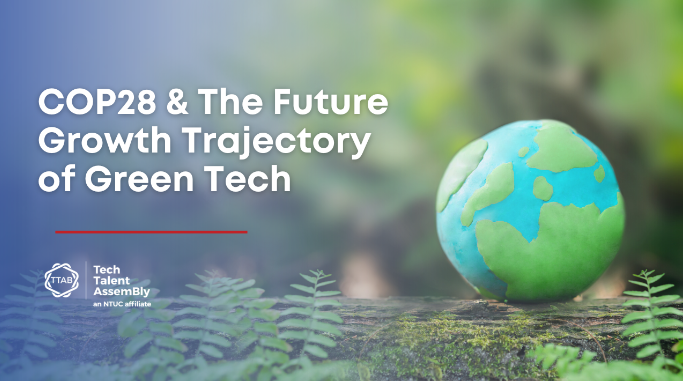Green Tech Economy & Demand for ESG Jobs in Singapore
The future is here, and not in a good way.
Why ESG Is Important and How To Build a Successful Career in Green Tech
The future is here, and not in a good way. Effects of climate change are visibly manifesting, with scientists recording the lowest ever annual peak for Antarctic sea ice. In a United Nations (UN) climate change report posted March 2023, humanity reportedly has just 10 years to salvage our climate before crossing the point of no return — where seemingly minor events like rising sea levels and increased precipitation will trigger a domino of natural disasters that threaten humanity.
But a sliver of hope remains. The burgeoning environmental, social, and governance (ESG) industry provides an abundance of roles for the working class to partake in climate action while earning a living.
Why choose a career in ESG?
ESG is a broad umbrella category for jobs involved in driving sustainable corporate practices and policies that mitigate negative human impact on the environment. Companies like PepsiCo and Nvidia have taken the lead by setting net-zero emission goals and adopting regenerative agricultural practices as well as powering advanced energy solutions.
More than just a KPI, these organisations are fighting the good fight against town-levelling floods and crop-annihilating droughts that are taking place as we speak. We’re already paying the price for disrupted supply chains by way of rapid inflation, and it won’t be long before more devastating climate events arrive at our shores. If nothing else, a career in ESG is not just one for those passionate about the environment, but anyone interested in safeguarding the future for themselves and their loved ones.
Are ESG careers lucrative and sustainable?
Because our economy depends on stable climate patterns and conditions, demand for ESG careers will likely continue to grow. But don’t just take our word for it — the UN projects that the green economy will create 24 million new jobs by 2030, provided that the right policies are enforced and sustainable practices are widely adopted.
Corporations will have good reason to invest in ESG, seeing how industries like agriculture, fishing, and forestry all require a stable, healthy environment to remain profitable. Brick-and-mortar corporations, too, will have a stake in keeping raw material costs low and stabilising their supply chains. In other words, jobs that sustain the very basis of life on Earth will always be necessary and in demand.
Locally, demand for ESG jobs has already gone up by a massive 257% from April 2019 to 2022. But even this figure is dwarfed by those in neighbouring countries, with Hong Kong and India clocking 400% increases and neighbouring Malaysia recording close to 1000% growth. Considering Singapore’s 2050 net-zero emissions target and overall hiring optimism, the cards for a sustainable future in ESG are lining up nicely.
What types of ESG jobs are there?
Unsurprisingly, ESG professionals are expected to uphold principles that align with environmental well-being. Because the environment is such a complex being, ESG jobs available on the market consist of anything from analysts and consultants to Corporate Social Responsibility (CSR) and portfolio managers. As the industry matures, roles available will undoubtedly continue to grow and evolve. The list below is by no means an exhaustive one, but should nevertheless provide a peak into what ESG careers can offer.
ESG Analyst
Found anywhere from private equity firms to banks, ESG analysts conduct research and analysis to ascertain corporate adherence to ESG standards. They assess various non-financial factors such as energy efficiency, human rights policies, and safety risk in order to quantify and label companies accordingly. In turn, companies that receive favourable evaluations will be able to appeal to a wider pool of investors. Such positions are typically suited for the financially- or data-inclined, as well as those who are capable of telling stories through said data. The average ESG analyst in Singapore makes $74K a year.
CSR Manager
CSR managers keep their organisations in check before the ESG analysts arrive. Their primary responsibility is to monitor regulatory compliance with social responsibility and promote its values. They often form both the external image and internal binding force of a company’s CSR, overseeing cross-departmental collaborative projects and embodying CSR values in external liaisons. One good example of this is Income Insurance’s recent Income Eco Run, a CSR initiative that promotes and reinforces its environmental stance. Because CSR managers frequently liaise with many stakeholders, such a position is suited to individuals with above-average people and communication skills. CSR managers in Singapore, on average, earn $87K annually.
Sustainability Consultant
Sustainability consultants endeavour to enhance their company’s ESG performance by minimising environmental footprint through custom solution design and fostering meaningful relations with clients. For example, a sustainability consultant in a food company may aim to achieve net-zero emissions in the food production process. As you might imagine, job scopes of sustainability consultants can vary greatly between companies. Successful consultants must therefore be capable of critical thinking and adapting to new environments. Sustainability consultants in Singapore make an average of $65K a year.
ESG Portfolio Manager
ESG portfolio managers analyse their organisations’ equity holdings to search for new decarbonisation opportunities and mitigate adverse environmental consequences before they occur. This means shifting funds from investments that damage the environment to assets that are sustainable. In recent years, large firms like JPMorgan, BNP Paribas and Commonwealth Bank have transferred funds out of coal and Arctic oil drilling in favour of supporting the environment. In scenarios like these, ESG portfolio managers take centre stage in guiding their organisations to assess sustainable alternatives, long-term risks and opportunities, and adopting responsible investing strategies. Their annual income ranges from anywhere between $65K–$400K.
Other roles in renewable energy, environmental engineering, sustainable architecture and much more have not been covered here, but there are plenty of ESG-themed job listing sites such as 1% For The Planet — where your passion for the planet and any related skills will be highly sought after.
How do you become an ESG professional?
ESG qualifications
Having the relevant educational background definitely helps when searching for jobs in ESG. Disciplines like environmental science and sustainability studies inculcate the necessary foundational knowledge to contextualise organisational environmental concerns.
Alternatively, gaining qualifications in ESG through certification is also possible. Each industry has its own specific environmentally themed certifications. For example, the Leadership in Energy and Environmental Design (LEED) credential is a recognised standard within the industry of sustainable architecture. For those with financial inclination, look to courses like the Singapore Management University’s Certificate in ESG for Professionals in Banking and Finance. For more general ESG education, online course sites like Udemy and Coursera have multiple courses to choose from.
Soft skills & job experience
That being said, qualifications aren’t the be-all and end-all in ESG. In fact, professionals should possess equal amounts of technical skills, social skills, and foundational knowledge. Analytical acumen plays a crucial role in organising and interpreting data, especially for the financial ESG dimension. Meticulous, methodological analysis and a flair for handling big data is bound to impress in a field that examines ESG performance from various business angles. Project management skills are significant for ESG professionals responsible for enhancing a company's ESG performance or producing ESG reports. Such tasks are often multifaceted endeavours that require excellent time management and people skills to produce punctual and accurate results.
Furthermore, effective communication skills are paramount given that ESG professionals often work in teams. They have to clearly communicate analyses to various stakeholders, including investors, policymakers, and the general public. ESG professionals are also responsible for aligning their colleagues and, occasionally, their organisations to a common sustainability goal. As such, strong interpersonal skills would take them far in explaining their positions and rallying people to a common cause. Lastly, ESG professionals should be highly adaptable in order to identify opportunities for positive change, and proactively propose the abolishment of ineffective policies.
Grab more networking and upskilling opportunities in green tech
The best time to take action was yesterday; the second best time is now. If working in the environment has always been a passion, now’s the time to check out the growing ESG sphere while the field is still developing? To stay updated on the latest green tech related events, upskilling courses, and job opportunities, follow TTAB on LinkedIn and Facebook or join the TTAB Career Conversation to get up-close and personal with seasoned industry professionals!



